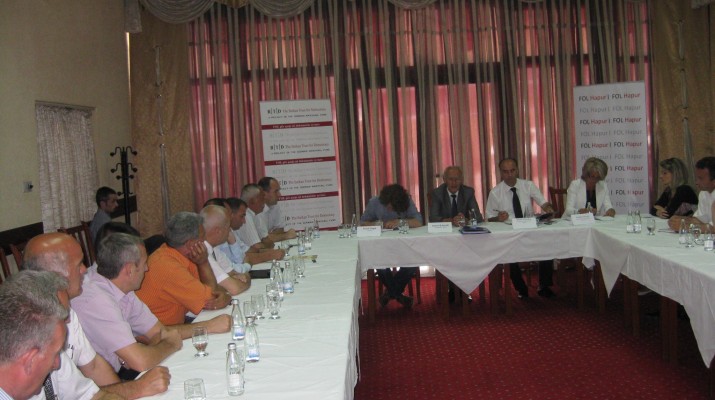Speak Openly with Prosecution of Gjilan and Ferizaj
Gjilan-Ferizaj, June 22, 2011– Movement FOL in cooperation with the State Chief Prosecutor, were in the next debate in Gjilan and Ferizaj within the campaign “Prosecutions closer to the citizen”. Participants in these debates have been representatives of civil society, media, and representatives of political parties and citizens of these municipalities. The panel members were Chief Prosecutor of Kosovo Prosecution, Mr. Ismet Kabashi, Mr. Jetish Maloku, Chief Prosecutor of District Prosecution in Gjilan, Mrs. Rabije Jakupi, chief Municipal Prosecutor in Gjilan, Mr. Alexander Lumezi, Chief District Prosecutor of Prishtina Prosecution and Mr. Shukri Jashari, the Chief Prosecutor of Municipal Prosecution in Ferizaj.
Petrit Zogaj of Movement FOL, thanking the participants said that ” Movement FOL in collaboration with the State Chief Prosecutor have initiated the campaign” Prosecutions closer to the citizen “, whereby the aim is that through the direct information of citizens, media and civil society, by Kosovo Chief Prosecutor, Chief Prosecutors of District Prosecutions and Municipal Prosecutors, to increase the level of transparency of this institution. “
State Chief Prosecutor, Mr. Kabashi said that the prosecution of the state through this campaign aims that the prosecution and prosecutors be closer to citizens, to inform them of the work of the prosecution and encourage them to cooperate closely with the prosecution. “According to him the year 2010 has been a successful year for the prosecution “even though prosecutors were faced with a large volume of work, the quality of this work is measured by the decisions of confirmed cases, where 95% of the cases of the prosecution have been confirmed by the courts. “Also, according to the chief prosecutor there are normal preconditions that the prosecution be an independent institution, where the “finances of the prosecutors has improved significantly, the establishment and Prosecutorial Council powers and laws approved last year for the courts and prosecution.” Mr. Kabashi in the debate conducted in Ferizaj said that thanks to the law on the courts approved last year, the municipality of Ferizaj will be with the Basic Court and Prosecution in 2013.
The debate continued with the Chief District Prosecutor in Gjilan, Mr. Jetish Maloku, who made a brief presentation of the work of the prosecution for the year 2010 and the first half of 2011. He said that “during 2010 there were about 335 cases, for 312 were filed criminal charges involving 422 grown up people and this number of cases is much higher than in 2009”. According to him, cases dealing with corruption and organized crime are given priority by the District Prosecution in Gjilan, where “in 2010 were processed 8 cases, 6 cases have been solved and two are being investigated and for the first half of the year 2011 were 10 cases, 7 of them were solved and 3 are being investigated. “Mr. Maloku emphasized that in order to increase transparency of prosecution many steps have been taken that the institution could be opened to the public as one of the main elements of restoring public trust in this institution.
Mrs. Rabije Jakupi, chief Municipal Prosecutor in Gjilan, after making a brief presentation of the report of the work of the prosecution for the year 2010, said, “Municipal Prosecution of Gjilan is one of the most successful prosecutions in Kosovo regarding the processing of the cases in court and their solving. “
In the debate held in Ferizaj, was also present the Chief District Prosecutor of Pristina, Mr. Alexander Lumezi, who said that this prosecution is the most charged regarding cases dealing with corruption and organized crime. In this context this prosecution “has filed 12 charges relating corruption”.
While Mr. Shukri Jashari, the Chief Municipal Prosecutor in Ferizaj, said “that in this prosecution are engaged four prosecutors and that until June 2011 were 1343 cases of adults and 122 cases of juveniles.” He added that this prosecution implements the plan that every day the citizens are accepted in the prosecutor’s office in order to increase the transparency of the institution of prosecution.
After this, the discussion was opened to the participants and had questions and answers, between participants and panellists invited to this debate.
